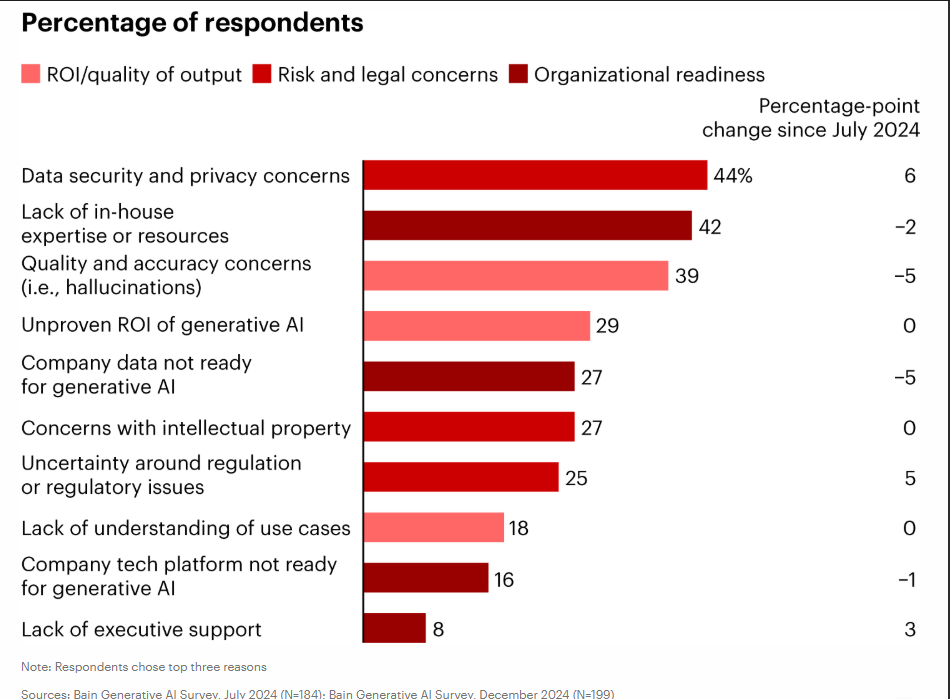by Lucy Morris

We’re hearing about AI constantly – which is ideal for a geek like me – but I’m increasingly seeing a divide in the world of in-house legal. One side is ramping up development, adoption and integration of AI tools and are seeing daily benefits; with a few teams even mentioning a reduction in headcount due to the benefits. The other side is somewhat cautious, slightly overwhelmed by all of the tool options and jargon. This article is written for the latter.
Overview in numbers
- Gen AI use in corporate legal departments surged from 28% in 2023 to 44% in 2024 (Bloomberg)
- Globally, over one in three legal teams are now using an AI tool, with 30% adoption and an additional 54% planning to onboard tools within two years, according to Lexpert.
- In the UK alone, AI use for in-house legal climbed from 11% to 41% in a year (Lexis Nexis).
But – a majority of GC’s and CLO’s say they’re unprepared for the risks of AI. These statistics suggest momentum, but also show that the majority of in-house legal teams are not currently leveraging AI. Return on investment? Still a work in progress.
Interestingly, as we collectively explore AI, the concerns are changing. The concerns of accuracy are slowing down, indicating that we are gaining confidence and expertise on how to use it. Along with the below chart, Bain highlights that companies in the earlier stages of adoption are more worried about organisational readiness and related roadblocks whilst those at later stages are thinking more about data security, privacy, quality, and accuracy. Unsurprisingly, traditionally risk-averse lawyers are not at the forefront of adopting this kind of tech.

A recruiter must talk about talent shortages
There weren’t many pure 10 PQE data privacy lawyers in 2018 and there aren’t many experienced AI counsel now. In the same breath, data privacy is still a highly sought after area – and a part of most in-house counsel roles – and I expect AI and legal ops will be the same.
AI use cases are designed to eliminate tasks and make admin, routine and first-reviews easier. I don’t think it’s about to replace lawyers, but all lawyers need to know how to use it and (more importantly) know what the risks are. If you can get involved in the exploration or implementation of any AI tools, it will help your career development over time. Future General Counsel will need to know how to manage AI as part of a team resource to free up strategic time, and paralegals need to know how to check accuracy of the tool for daily tasks.
I remain cautious of the use of AI in any search, selection or screening as the risks for discrimination, bias and future lawsuits are too high. That’s not to say that applicants or interview panels shouldn’t use it at all: uploading a job description and prompting for effective interview questions is a good suggestion for both sides.
Where to start (not an ad)
I’m not a lawyer, but have heard consistently good things about Ironclad, GC AI, Juro and Harvey. The most common talking point has been about training and learning how to prompt – countless stories of two people using the same tool, but getting varying quality responses because they’re prompting differently (more on this in Bloomberg).
At Crafty Counsel last week, I had various conversations on interesting things people are using AI for. Common answers were; planning holidays, voucher codes or event planning/ideas. If you’re unsure where to begin – I think that’s a safe (but very useful) starting point. I’d check that it’s not hallucinating before you book flights, though.
Hiring? We can provide thoroughly vetted talent, market updates and wider support as your team scales. If you’re hiring now or in six months, reach out for an introductory conversation.
For lawyers with an interest in tech, or AI: there are many pathways in. Reach out for a confidential conversation.

